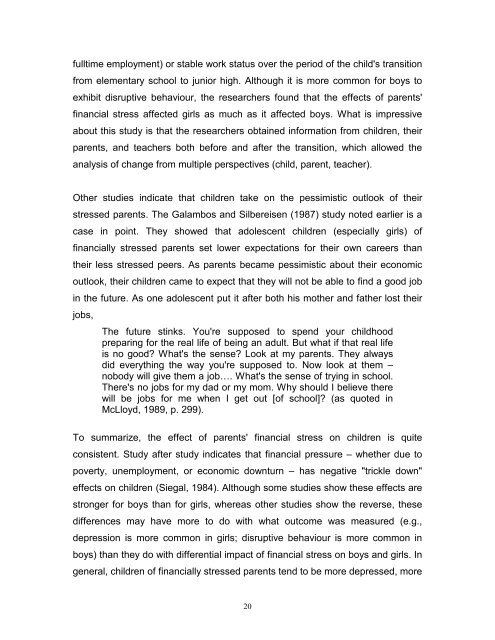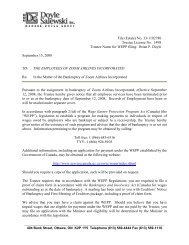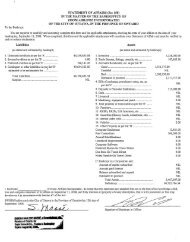Download the Carleton University Report (PDF). - Doyle Salewski Inc
Download the Carleton University Report (PDF). - Doyle Salewski Inc
Download the Carleton University Report (PDF). - Doyle Salewski Inc
You also want an ePaper? Increase the reach of your titles
YUMPU automatically turns print PDFs into web optimized ePapers that Google loves.
fulltime employment) or stable work status over <strong>the</strong> period of <strong>the</strong> child's transition<br />
from elementary school to junior high. Although it is more common for boys to<br />
exhibit disruptive behaviour, <strong>the</strong> researchers found that <strong>the</strong> effects of parents'<br />
financial stress affected girls as much as it affected boys. What is impressive<br />
about this study is that <strong>the</strong> researchers obtained information from children, <strong>the</strong>ir<br />
parents, and teachers both before and after <strong>the</strong> transition, which allowed <strong>the</strong><br />
analysis of change from multiple perspectives (child, parent, teacher).<br />
O<strong>the</strong>r studies indicate that children take on <strong>the</strong> pessimistic outlook of <strong>the</strong>ir<br />
stressed parents. The Galambos and Silbereisen (1987) study noted earlier is a<br />
case in point. They showed that adolescent children (especially girls) of<br />
financially stressed parents set lower expectations for <strong>the</strong>ir own careers than<br />
<strong>the</strong>ir less stressed peers. As parents became pessimistic about <strong>the</strong>ir economic<br />
outlook, <strong>the</strong>ir children came to expect that <strong>the</strong>y will not be able to find a good job<br />
in <strong>the</strong> future. As one adolescent put it after both his mo<strong>the</strong>r and fa<strong>the</strong>r lost <strong>the</strong>ir<br />
jobs,<br />
The future stinks. You're supposed to spend your childhood<br />
preparing for <strong>the</strong> real life of being an adult. But what if that real life<br />
is no good? What's <strong>the</strong> sense? Look at my parents. They always<br />
did everything <strong>the</strong> way you're supposed to. Now look at <strong>the</strong>m –<br />
nobody will give <strong>the</strong>m a job…. What's <strong>the</strong> sense of trying in school.<br />
There's no jobs for my dad or my mom. Why should I believe <strong>the</strong>re<br />
will be jobs for me when I get out [of school]? (as quoted in<br />
McLloyd, 1989, p. 299).<br />
To summarize, <strong>the</strong> effect of parents' financial stress on children is quite<br />
consistent. Study after study indicates that financial pressure – whe<strong>the</strong>r due to<br />
poverty, unemployment, or economic downturn – has negative "trickle down"<br />
effects on children (Siegal, 1984). Although some studies show <strong>the</strong>se effects are<br />
stronger for boys than for girls, whereas o<strong>the</strong>r studies show <strong>the</strong> reverse, <strong>the</strong>se<br />
differences may have more to do with what outcome was measured (e.g.,<br />
depression is more common in girls; disruptive behaviour is more common in<br />
boys) than <strong>the</strong>y do with differential impact of financial stress on boys and girls. In<br />
general, children of financially stressed parents tend to be more depressed, more<br />
20





